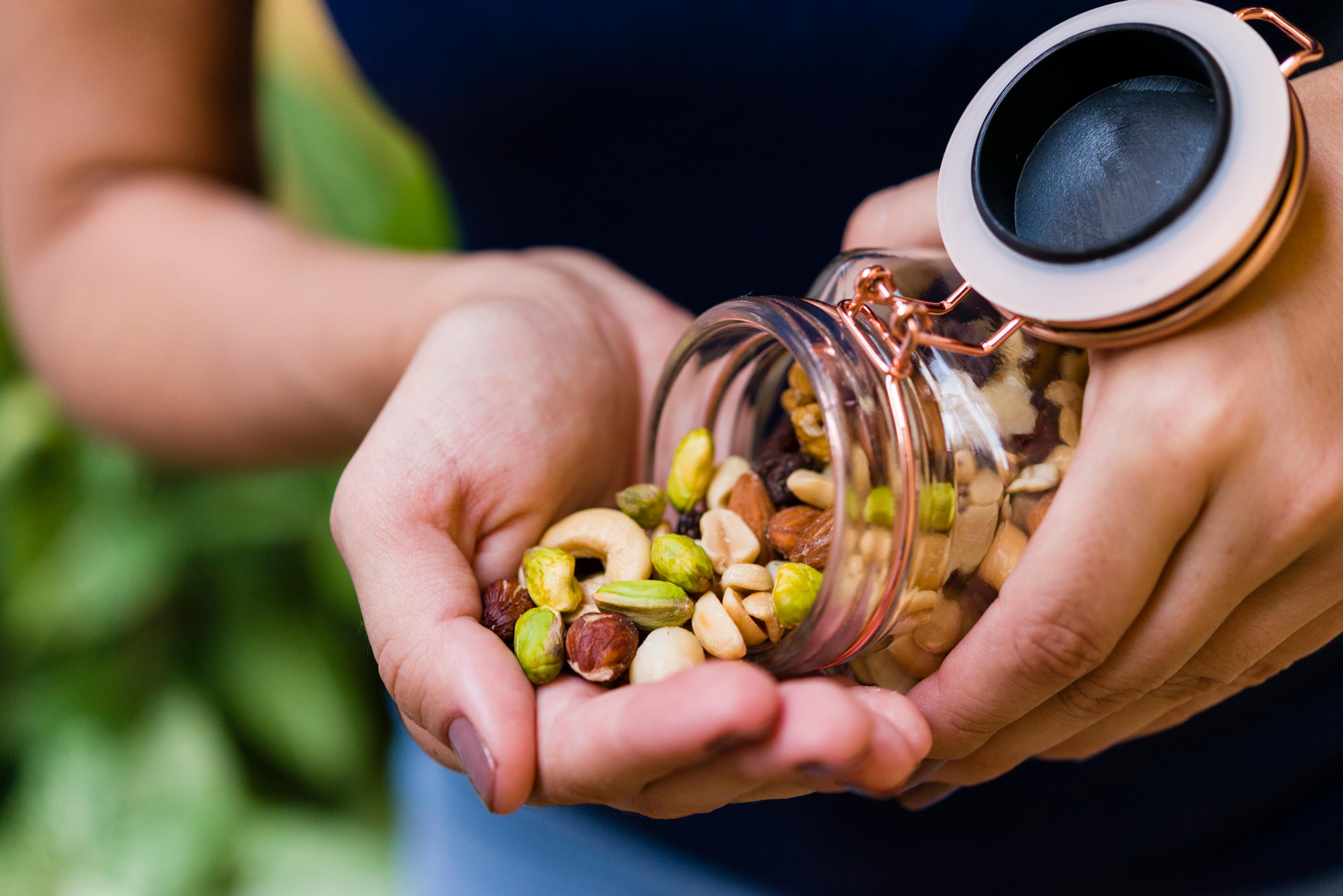The Importance of Gut Health
| 1 min read

00:00
00:00
About the Show
On this episode, host Chuck Gaidica and registered dietitian Grace Derocha discuss the importance of gut health, and what probiotic and prebiotic foods we can begin adding to our diet to get the most out of our gut health.
“I would tell people to think about your gut health, think about how you’re feeling. I’ve had tons of different patients that would tell me they’re not feeling well regularly – feeling gassy and bloated. Sometimes when we start with some of these basics (adding in good, healthy probiotic and prebiotic foods), they feel so much better.” – Grace Derocha
In this episode of A Healthier Michigan Podcast, we explore:
- How our gut works as our second brain. It can help boost immunity, absorb nutrients and lead to better brain health.
- The difference between probiotics and prebiotics.
- The benefits of probiotic foods such as pickled vegetables, kimchi, kombucha and dark chocolate.
- Why we should also eat prebiotic foods such as artichokes, jicama and apples.
- How cultural differences and a busy lifestyle can affect your health.
- How our stress levels can lead to gut issues and how probiotics can allow you to decompress for a better balance within your body.
- What types of supplements we should be taking for gut health.
- Recipes to start implementing into your diet.
Transcript
Chuck: This is A Healthier Michigan Podcast episode four. Coming up, we discuss the importance of gut health.
Chuck: Did you know your gut was off? I didn’t know mine was but we’ll figure it all out. Welcome to A Healthier Michigan Podcast. This is a podcast dedicated to helping all of us improve our health and well being through small healthy habits and we can start implementing them right now. I’m your host Chuck Gaidica, each week we’re going to sit down with a certified health expert from Blue Cross Blue Shield of Michigan and we’ll cover things like well being, we will do stress reduction, we’re getting into nutrition and on this episode again, talking about gut health. It doesn’t sound as pretty as I think the episode will sound.
Chuck: Grace Derocha is back. She’s a registered dietitian, certified health coach at Blue Cross Blue Shield of Michigan and she also is a blogger at A Healthier Michigan, same place you can find the podcast, you can also find Grace’s blog. She’s got two kids, a wonderful husband name Tom who we’ve learned likes ice cream and it’s still okay in the house of a nutritionist and somebody who’s a dietitian. She’s a lover of food, of people and life and I just love being with you again. Good to have you back.
Grace: Thanks so much Chuck.
Chuck: Yeah, can you tell that my gut’s okay?
Grace: Yeah.
Chuck: Can you tell? Am I okay Grace?
Grace: I hope so.
Chuck: Yeah.
Grace: No, you are, you are,
Chuck: All right, that’s good.
Grace: Keeping it healthy.
Chuck: Why is that so important and we’re hearing this … I’ve even seen somebody who’s billing themselves as a gut health coach, like they’re going to help us with probiotics and whatever.
Grace: Very interesting.
Chuck: Why is this so important? Not like it shouldn’t have been before, but why is it?
Grace: I think people are actually realizing how important it is in our gut. So our gut is our GI tract, our gastrointestinal tract, which involves everywhere from our mouth down to our stomach and intestines and colon. So why it’s important is that our gut works almost as a second brain because it can help boost immunity, it obviously helps with absorption of our nutrients, but the healthier our gut is, we have seen and research shows you have better memory, you have better brain health and obviously overall health as well.
Chuck: So I’ve seen people try to … and actually fix things, with probiotics or they switch, they add some yogurt after they’ve been hospitalized on antibiotics, there are tricks that I see that are actually working. For most of us, through our daily life, if we’re eating healthy, whatever that is, but let’s just say we’re eating average healthy, do we need to worry about supplementing or doing other things?
Grace: I know I keep saying this, a supplement is going to supplement what you’re already doing, so ideally, if we can add some probiotic foods or prebiotic foods, and I tell you what those are in a second, it’s going to help our gut and you may not need the supplements. However, if you need a little more help, a supplement can help you.
Chuck: And it’s important for all the reasons you talk about and I’ve heard … we actually have a son who’s got an autoimmune disease, and with autoimmune diseases, you see one of the fastest growing additional problems with autoimmune of any kind. You could have arthritis and all of a sudden five years later, celiac disease. You’re going to have to go gluten free, not because it’s trendy, but because … and they still don’t know why that’s happening that people with autoimmune, you’ve got a huge population.
Grace: Well, and celiac disease is actually an autoimmune disease itself.
Chuck: Oh so if you’ve got real celiac?
Grace: Yes, real celiac.
Chuck: Yeah. So we’re seeing this happen. Is this just because as a population, as Americans, we’ve gotten away from the good stuff?
Grace: Yes. So I’m glad that you brought this up because I worked as a pediatric dietitian for a long time as well and my type one diabetics, which type one diabetes is autoimmune as well, they were also coming into their teenage years with celiac disease.
Chuck: I had never heard until this minute that type one diabetes was an autoimmune disease.
Grace: Yes.
Chuck: That’s wild to think.
Grace: Yes, not type two.
Chuck: Yeah, right, right?
Grace: But type one, mm-hmm (affirmative).
Chuck: So okay, let’s dig into this a little bit because it’s really fascinating to me but we’ve got to understand some of the terms. We’ve got probiotics and prebiotics. So the word pre kind of tells me that comes first but I’m not sure what I’m not sure about.
Grace: Yes.
Chuck: Okay.
Grace: So probiotics are the good, pro, bacteria in our guts, our GI tract, we naturally have them but we need to make sure that they flourish. So what I always say is if you think of the probiotics as the flowers of good health growing in your gut, the prebiotics would be fertilizer to help that grow. So probiotic foods naturally are usually foods that are pickled, so pickled vegetables, kimchi which is a Korean pickled dish, and then yogurt, kefir, kefir is like a yogurt based drink naturally have probiotics in them. Dark chocolate has a little bit.
Chuck: Does it?
Grace: Yeah.
Chuck: Oh see, that’s real.
Grace: At least 70% cacao for the people out there, if you’re … What else? Kombucha, I actually make kombucha at home. Kombucha is a fermented tea that you can make and that’s become really popular. It’s funny because I grew up drinking it, my mom made it at home.
Chuck: So kombucha, is that the one where you use the whisk and it’s all green and powdery, or is that some other tea?
Grace: No that’s matcha.
Chuck: Oh that’s matcha, okay.
Grace: I also love matcha but kombucha is a fermented tea.
Chuck: Oh I’ve tried that, no. You drink it now?
Grace: Yeah, I drank it growing … I make it-
Chuck: Oh, you do?
Grace: I should have brought you some but yeah as a kid I drank it, my mom made it and we had the thing called the scoby, which is that living organism that helps ferment the tea.
Chuck: Wild.
Grace: It’s crazy.
Chuck: So your background, mom is Filipino, right?
Grace: Mm-hmm (affirmative) mom and dad, yeah.
Chuck: Dad too.
Grace: Mm-hmm (affirmative).
Chuck: Do you see, when you look at the Philippine population, the notion of what you even told us in a previous episode, that breakfast was maybe brown or white rice, a little piece of fish, you were balancing your-
Grace: Yeah, pickled vegetables.
Chuck: Oh, interesting,
Grace: Yeah.
Chuck: And maybe tea?
Grace: Yeah.
Chuck: So when you look at the population of the Philippines-
Grace: Or my shot of kombucha, yeah.
Chuck: … interesting. Can you see that people growing up had a different health structure and then they came to the States and things shift?
Grace: Yes, definitely.
Chuck: Really? Yeah.
Grace: Yeah, so my dad … I feel like my dad was a perfect example, my dad was a surgeon, but he became type two diabetic and he passed when I was young-
Chuck: Oh, I’m sorry.
Grace: … because he didn’t take care of himself. He got down into the french fries and the fast food restaurants with his busy lifestyle and didn’t take care of himself even though he was one of the smartest men I knew, but didn’t take care of himself enough. So I think the impact of what our culture here in America has provided, as far as the way we eat.
Chuck: Did some of that inspire you-
Grace: Oh yeah.
Chuck: … for the teacher you’ve become of everything nutrition?
Grace: Yeah.
Chuck: That is it?
Grace: Mm-hmm (affirmative).
Chuck: But we’re blessed because of that now, I mean really, we are because you’ve got so much knowledge to give us. Okay, let me go back so I can understand. Prebiotics then, how are we going to get those? I kind of understand probiotics, I can grab a yogurt and get some, I can get kombucha.
Grace: Yeah, so prebiotics are usually fruits and vegetables and the fiber in them, soluble and insoluble fiber, found in them, help feed our probiotics. So artichokes, jicama, dark leafy greens, apples.
Chuck: So an apple a day could keep the doctor away?
Grace: Could definitely help.
Chuck: Wow, so there’s a reason I like …
Grace: So definitely the fruit and vegetables and whole grains. Oatmeal is another good prebiotic, help feed probiotics so that they can grow and flourish and do what they need to do. Because when our probiotics are strong, obviously I talked about the immune system and second brain and all that, but just we are able to digest food more efficiently and then absorb it as well and then it’s more effective so that we’re getting all of that nutrition from our food, that we’re consuming in the best way possible.
Chuck: So I just learned something from you and I want to admit to you that in the past month I learned something from my dog and I learned it by way of our veterinarian. So my dog had what I thought was an emergency problem, so I took her to an emergency vet place, it looked to me to be a serious problem related to her gut and she had just eaten something that she shouldn’t have around the house and I thought, “Ah, I better have her checked out.” You know what the prescription was? Was for me to go home and cook her plain brown rice and boiled chicken, just a basic plain old diet and then I had little bags from Purina, of probiotics and sprinkle that on the food and within four days, it was actually faster but in terms of it actually being done, I was supposed to do this for 10, I’m standing there and I didn’t even know you and I would talk about this and I’m thinking, “This is a good lesson for my life. Look at how impactful that switch was on my dog,” and she’s like, “Hey, everything’s cool, everything’s … ”
Grace: Yeah, she went to whole foods, got some probiotics to keep her gut healthy.
Chuck: Right, so when I say my dog takes me for walks, that’s true and now when I say my dog is teaching me things, that’s also true.
Grace: Yes. I love that, I feel like that’s a really good example and obviously there are a variety of digestive issues that might not be fully solvable by doing this, but even because our stress levels can be affected by our system one way or the other, high stress, sometimes you have gut issues-
Chuck: Interesting.
Grace: … whether it be bloating or cramping or gassiness, because of the way stress can impact you, but probiotics not only help as a second brain and the immune system, but they also can help allow you to absorb nutrition efficiently and also allow you to decompress and allow your hormones to balance better within your body.
Chuck: So what can we add to our diets? Short of a problem that you have with dairy, should we be adding yogurt? What are the things that you would say would be some of the go-tos that don’t sound so strange at first that we really can grab them?
Grace: Yeah, I think yogurt is a great one, I think if you don’t like the taste of yogurt, even adding yogurt to your smoothies, or kefir to your smoothies.
Chuck: Just a little?
Grace: Mm-hmm (affirmative), yeah. Just for a little bit of health. And I get this question all the time so I feel like I should answer it. If you’re going to take a supplement, there’s a few things that you should look for. So there’s probiotic supplements, there is symbiotic ones that have prebiotic and probiotic in it but one of the main things that you want to look for is that it’s a good quality company, of course, and make sure that there is, for adults, at least one billion per part of the probiotic in that … parts per million, in that supplement.
Chuck: All right, one billion per part.
Grace: Yes.
Chuck: That’s the benchmark.
Grace: Yes.
Chuck: Something else hits me when you talk about oatmeal, my wife just bought me a container and for me, it was kind of counter-intuitive, the weather was still kind of warm, I think of oatmeal as I’m waiting for fall and winter and snow to fly. So I start supplementing, because I’ve been eating Kashi for breakfast and healthy stuff right?
Grace: Yeah, yeah.
Chuck: So I start adding oatmeal and as I’m making it one morning I’m thinking to myself, how many men, I don’t really know many women that I would talk to about their health, but how many of my buddies have said, either they’re working out and they’re doing great, or they’ve gone on a diet, or they’re lifting weights and I would say to them, “So what do you eat for breakfast?” And they may say something a little more than oatmeal, maybe, “I have an egg but I also have oatmeal.” And oatmeal was coming up once a month in some kind of random discussion, there was a thread. The people who I would look at around me, who I would say, “They’re pretty healthy people.” These guys? They’re eating oatmeal.
Grace: I love oatmeal.
Chuck: Do you?
Grace: Yeah.
Chuck: Yeah.
Grace: Yeah, oatmeal’s great-
Chuck: It’s cheap.
Grace: Yeah, it’s cheap, it’s delicious, you can make it sweet or savory, you could … I like to mix peanut butter and apples-
Chuck: What do you mean savory? What would you do with oatmeal?
Grace: Oh, so it doesn’t have to be sweet.
Chuck: What?
Grace: Yeah.
Chuck: Wait, what would you do?
Grace: So you could add turmeric, which is herb.
Chuck: Oh yeah, okay.
Grace: Turmeric and salt and pepper, make sure you have pepper if you have turmeric because the black pepper helps tumeric absorb efficiently. And then spinach, mushrooms.
Chuck: So it is kind of like a quinoa-
Grace: Yeah.
Chuck: … you could use it as a side.
Grace: Almost like a stew.
Chuck: Never thought of this idea.
Grace: So good.
Chuck: Oh my gosh.
Grace: Yeah.
Chuck: And turmeric, because of the advantages we read of turmeric in our-
Grace: Yeah, anti-inflammation.
Chuck: Really?
Grace: But make sure … because again, the curcumin in the turmeric is the property that helps us decrease inflammation, but you need black pepper with turmeric to absorb it.
Chuck: Okay.
Grace: So just reminding the people of that.
Chuck: Okay, so just having a supplemented … I know a lot of people do this, they’ll have turmeric as a supplement, but they’re not getting any black pepper.
Grace: Yeah, so if the supplement has black pepper added into it, then that’s better, but again, I love it when people get it from the food itself.
Chuck: This is bonus material. For this episode, we went a little off reservation but it’s a really good advice about what we get-
Grace: Yeah, and also with our gut health, we do have a lot of inflammation at times. You know-
Chuck: Yeah.
Grace: … if you’re having a lot of coffee or a lot of alcohol or if you’re on different medications or any antibiotics, medications that you might have to have depending on a chronic conditions you have, but if you just got sick and were on antibiotics, so bringing that gut health back and reducing inflammation, all these things are kind of linked and tied together to help us.
Chuck: Haven’t we seen in America, at least, in the West that the increasing use of antibiotics for everything. They’re worried about how we’re going to fight disease someday because we’re becoming immune to average or standard, but what are we doing to our gut health? Because somebody just puts us on antibiotics, you go and they say, “Yeah, I’m not sure what you have, if it’s viral or bacterial, just take these and you’ll get better.” Well, maybe not.
Grace: Right, and that’s why we need to make sure that we’re taking care of our bodies.
Chuck: Yeah.
Grace: After that, before that.
Chuck: Any other recipes? Because I still have my pen.
Grace: Yes.
Chuck: Anything else with probiotics?
Grace: I do have a great pickled vegetable recipe on there, you can make your own pickles, I’ve done that before with all the cucumbers in the garden, sometimes you get too many.
Chuck: Yeah, with the real canning process or is there a-
Grace: Yeah.
Chuck: … faster way to the finish line?
Grace: Yeah a jar. I mean you can cheat it-
Chuck: You have to right?
Grace: Yeah, a little bit, use Mason jars. Oh sauerkraut, how did I forget sauerkraut?
Chuck: Yeah.
Grace: Sauerkraut is a great one.
Chuck: That’s not something, short of seeing a Reuben sandwich advertised from some place, I don’t think most people think of adding sauerkraut unless it’s something in their past-
Grace: Right, yeah.
Chuck: … like the way they were brought up.
Grace: But sauerkraut is delicious and that’s a natural probiotic.
Chuck: What would you put it with? Like a pork chop? Or what would you …
Grace: So, you’re going to make fun of me-
Chuck: No, not that you know of.
Grace: Sometimes I will just add sauerkraut to my salad as the dressing because it has that-
Chuck: Just cold?
Grace: Mm-hmm (affirmative).
Chuck: Interesting.
Grace: Because it has that vinegary dressing taste and then-
Chuck: Right? It is cabbage, right?
Grace: And then some feta cheese because that’s delicious too.
Chuck: Wait, with sauerkraut?
Grace: With feta cheese, like on my salad.
Chuck: Yeah.
Grace: And so it’s like my dressing.
Chuck: I am so not going to make fun of you when we’re done so I don’t think you have to worry about it. Okay, so we’ve got sauerkraut, that’s a good probiotic, anything else for a recipe maker? Pickles?
Grace: Yes.
Chuck: Yeah?
Grace: What I would tell people too, think about using the yogurt in different forms. So my kids and I make yogurt bark, have you ever heard of that before?
Chuck: Yogurt bark? No.
Grace: So yogurt bark, that’s what I call it, but you take yogurt and you kind of lay it out on a cooking sheet, parchment paper, so you can freeze it, and then you add in whatever you want. Berries, fruit, nuts, dark chocolate-
Chuck: Oh, interesting.
Grace: … coconut flakes, freeze it and then you kind of break it up and it’s like your own kind of popsicle.
Chuck: Yeah, but you don’t put on a stick? Or you could I guess?
Grace: No, you could but it’s just easier because then you don’t have to. It’s a great dessert and then you add your dark chocolate in there because then you’re going to get some probiotic and a prebiotic from it.
Chuck: Asterisk, with at least 70% cacao.
Grace: 70% cacao, yeah.
Chuck: Right?
Grace: Coconut flakes, that’s another great prebiotic.
Chuck: So can’t you throw a little mini M&M’s in there?
Grace: You could, I’m nice.
Chuck: Yeah? Okay. There is a thread here I’m seeing with some of what you’re saying is probiotics, there’s a sourness.
Grace: Yes.
Chuck: Right? Is that a general tip-off, that it maybe is a probiotic.
Grace: Yeah, the fermented, the sort of-
Chuck: It is? Okay.
Grace: … having it ferment allows that probiotic to grow and build.
Chuck: This is good stuff, this is really good stuff because I have to tell you, maybe because I don’t have issues, I’ve never thought of really overtly planning a meal or even something to supplement. I throw yogurt in every once in a while with a protein drink but I don’t really do it enough and with the 000 yogurts, you can get healthy stuff on them.
Grace: I would tell people to think about your gut health, think about if you’re having bowel movements regularly, think about how you’re feeling. I have to tell you, I’ve had tons of different patients that would tell me that they’re not feeling well and not going to the bathroom regularly and feel gassy and bloated. Sometimes it’s a food allergy or a real issue that we have to get down to, but sometimes when we start with some of these basic things, and looking at they’re having too much fried food, or they’re drinking way too much coffee, that when they scale back and then add some of these good healthy probiotic and prebiotic foods, they feel so much better.
Chuck: It’s like the stuff I learned from my dog.
Grace: I know, I’m telling you.
Chuck: She’s smart, I knew that already, she just turned nine.
Grace: You guys are a family of smart people.
Chuck: Well, the dog is now … Our son Matt just reminded us, our dog turned 63 in dog years.
Grace: Yes, right, right, right.
Chuck: Yeah, so she can now qualify for the discount at Denny’s, the senior discount, so I’m going to take her everywhere with me. All right Grace, good to see you again.
Grace: Good to see you.
Chuck: Can’t wait for our next episode of this is our Michigan podcast, brought to you by Blue Cross Blue Shield of Michigan, we’re glad you’re with us. It’s called A Healthier Michigan Podcast. You can check it out and also check out Grace’s blog at ahealthiermichigan.org/podcast. If you like what you’re hearing, you could leave us a rating or a review on iTunes or Stitcher. New episodes are available on your smartphone, your tablet, really nearly any device. Be sure to subscribe to us on Apple podcast, Stitcher, or your favorite podcast app. Next week, we’re going to have Grace back again and we’ll be talking a little bit about how to approach meal prep. Especially as a mom with two kids under six, that’s a huge thing, how do you get productive? What do you do? Meal prepping, we’ll talk about that next time. Take good care.





